
When contending with a hectic schedule, a little extra energy can go a long way. Energy drinks offer exactly this, providing a welcome lift when you need it most, whether that’s in the gym, at your desk or otherwise.
The problem is, some people don’t fancy the sickly sweet flavours, unpronounceable ingredients and questionable amounts of caffeine in your average can. To find some suitable alternatives, we asked a nutritionist what to look for in a good energy drink, then tested some of the best to bring you a list of our favourites.
Edward Mather, expert nutritionist at FuelHub, says people should steer clear of drinks that exceed their personal caffeine tolerance as this can lead to “gastrointestinal distress, jitters and restlessness”. Below, you’ll find some lower caffeine options, as well as several that leave this stimulant out altogether. Mather also says high-sugar drinks should be swerved if you’re not using them as fuel for exercise, as drinking these may cause you to crash later in the day, so we took this into account while making our selections.
Scroll down to see our tried and tested pick of the best energy drinks that meet the expert’s standards. We’ve also taken a deep dive into the active ingredients you’re likely to find in an energy drink, and their potential effects. So, next time you’re faced with shelves of colourful cans, you can make an informed choice.
How we tested
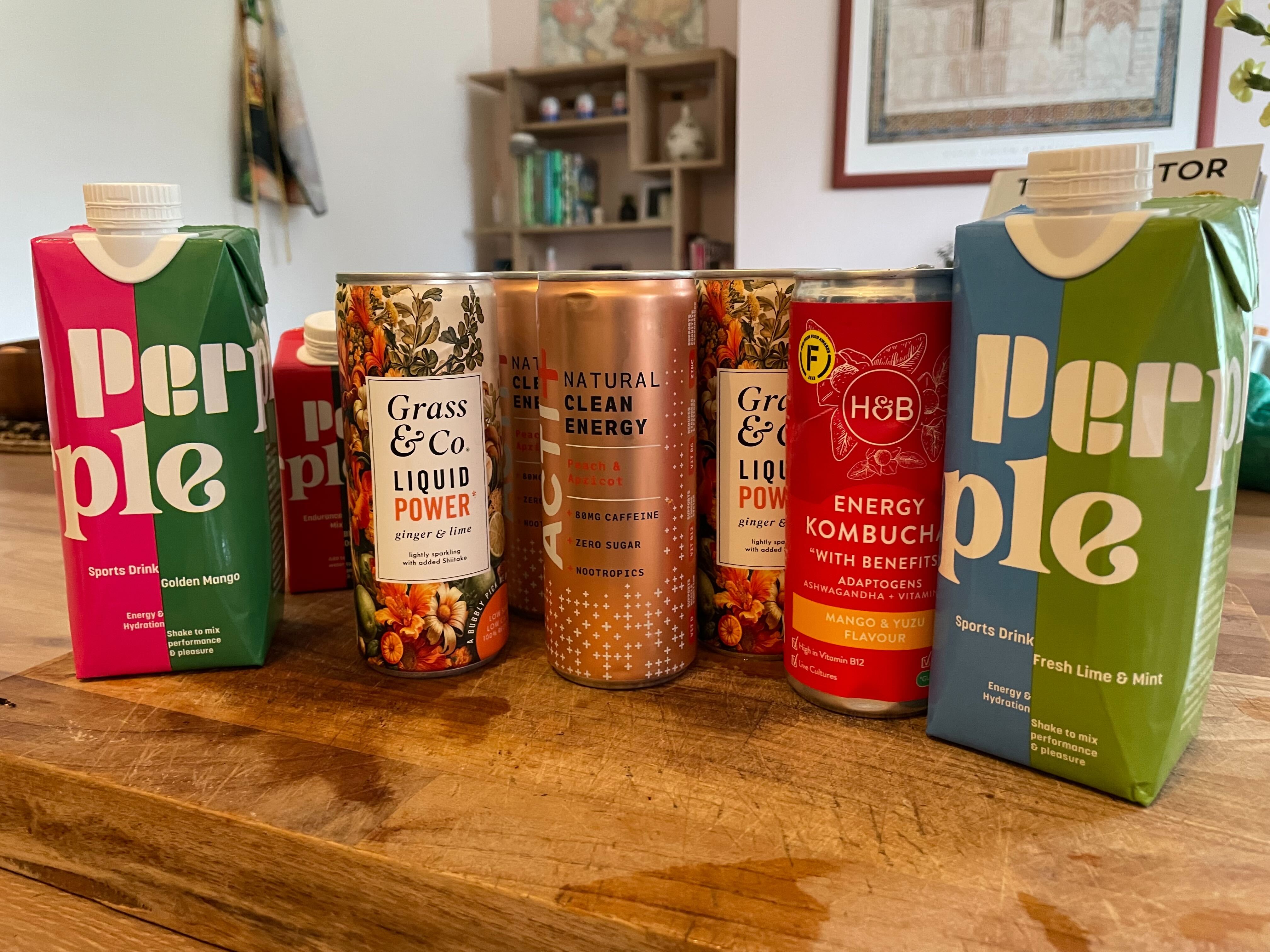
To test the energy drinks on this list, and more that were omitted, our tester tried adding them into his regular routine. This involved occasionally drinking one on the walk to the gym before a morning workout, and other times having one around noon in a bid to avoid that semi-regular post-lunch slump.
Our tester rated each drink on its flavour, as well as any noticeable impact it had on energy and concentration levels – any drink that provided a gentle boost and didn’t then lead to a slump a few hours later was sure to score well. Bonus points were on offer for nutritionist-approved ingredients boasting extra health perks.
Best energy drinks of 2024 are:
Grass and co liquid power
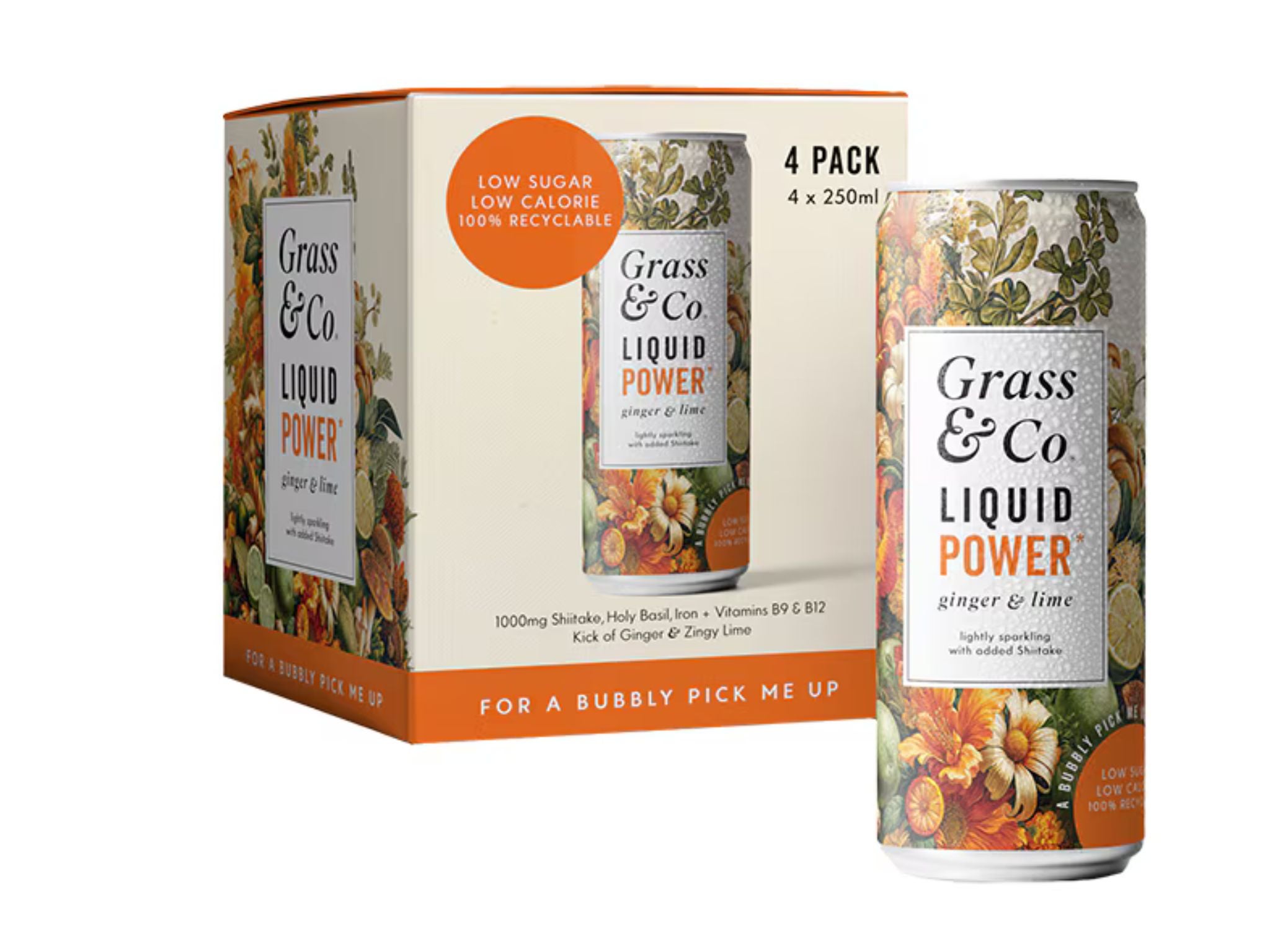
From health shots to herbal teas, the taste of ginger has become synonymous with health drinks, so it’s no surprise to see it cropping up in this Grass and Co option. It’s the dominant flavour, overpowering the lime, but the overall experience is still fairly subtle – more like a flavoured sparkling water than an in-your-face energy drink. As someone who doesn’t have too much of a sweet tooth, this was something I enjoyed.
The drink has a refreshingly recognisable ingredients list too; the main ingredient is water, followed by apple concentrate and lime juice. You’ll also find 74mg of caffeine inside each can to lift your energy levels, and shiitake mushroom extract – a nootropic, or brain supplement, included to help energy release.
Beyond this, the drink also has added vitamins B9 and B12, with the latter involved in helping the body release energy from food, as well as natural holy basil and iron. When I drank a can at lunchtime on a work day, it left me alert rather than fidgety. It didn’t cause me to crash a few hours later either, which can’t be said for many other mainstream energy drinks.
Buy now £2.50, Hollandandbarrett.com
Holland and Barrett energy kombucha
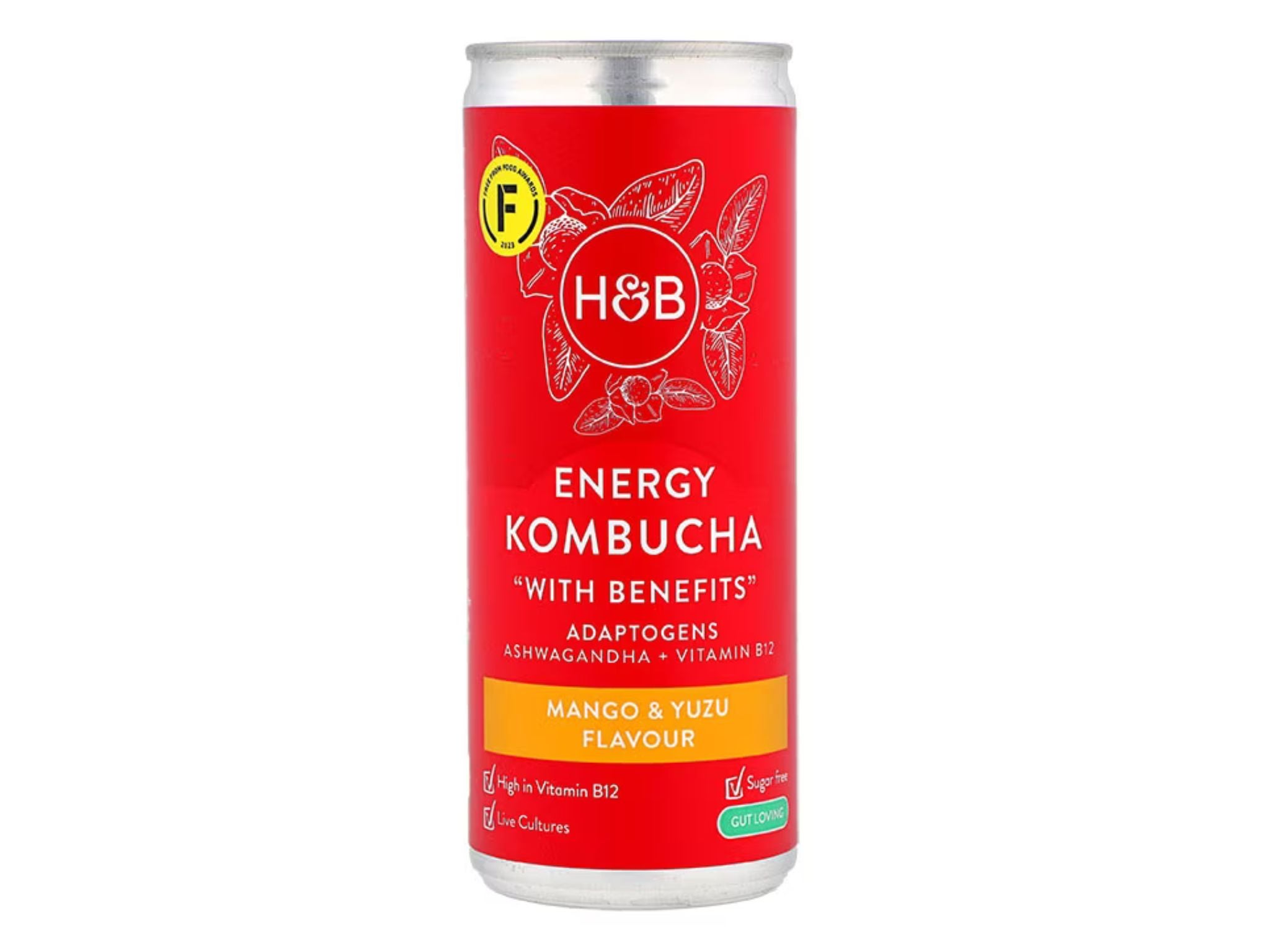
Drinking caffeine within an eight-hour window of your bedtime can seriously hamper sleep quality, The Sleep Scientist founder Sophie Bostock told me during a recent interview. As such, I try to steer clear of the stuff after lunchtime.
Happily, Holland and Barrett’s mango and yuzu energy kombucha is caffeine-free, making it a more suitable mid-afternoon refreshment option. It contains ashwagandha extract, which has been linked to lessening stress and improving sleep quality, as well as kombucha – a fermented tea drink reputedly able to help with gut health and function.
As a mango fan, I was initially a bit disappointed by the background role this flavour played. But the ever-intriguing taste of kombucha proved to be a worthy substitute which I found incredibly refreshing.
The drink didn’t give the same easily recognisable energy boost as the caffeinated drinks on this list, but it still provided an enjoyable post-lunch pick-me-up.
Buy now £1.80, Hollandandbarrett.com
Myvegan sparkling energy drink
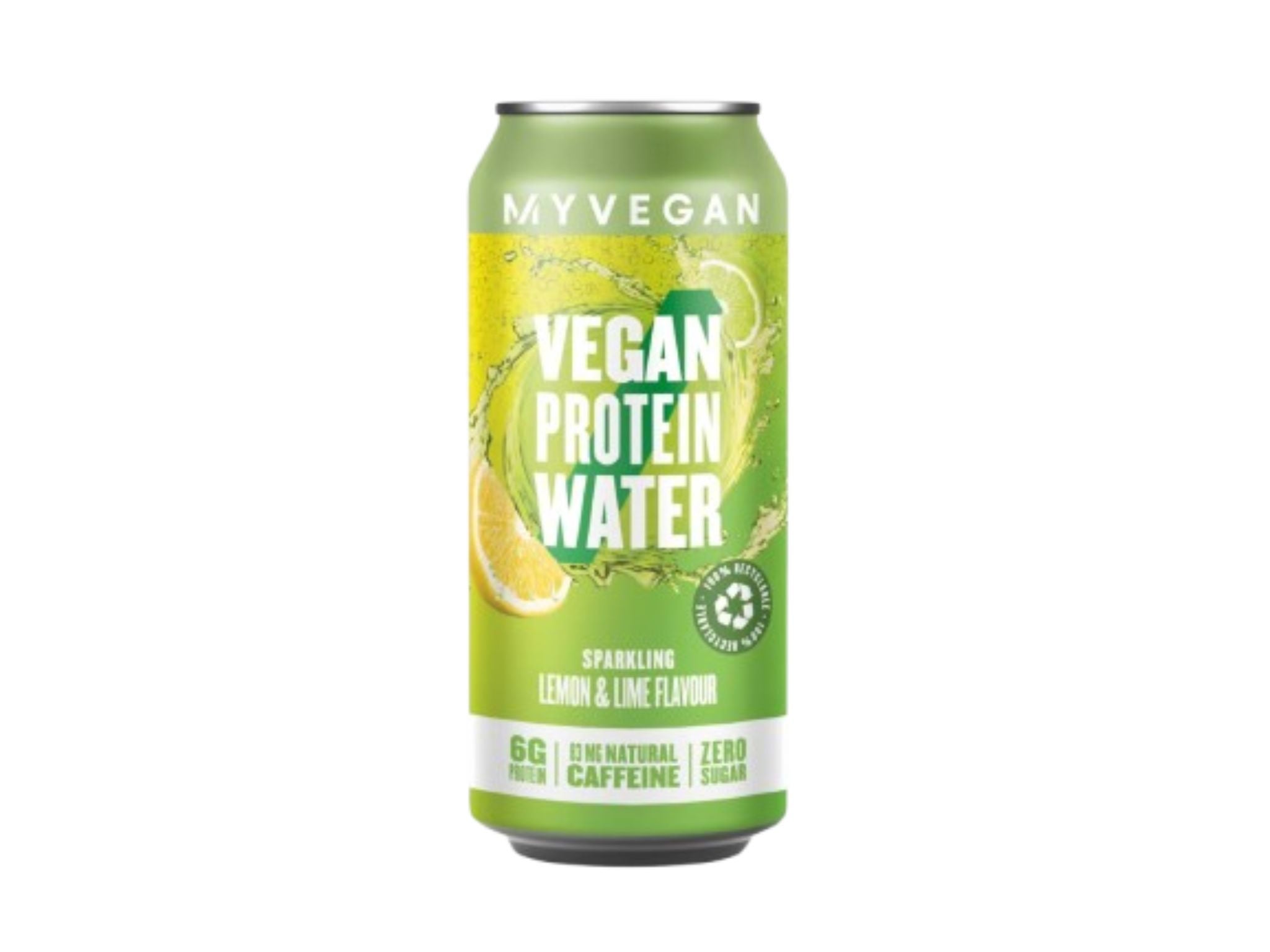
Your average energy drink comes in a chunky 500ml can, crammed with 150mg or more of caffeine and boasting a bizarre mix of ingredients, many of which you’ve never heard of. I enjoyed the Myvegan sparkling energy drink because it played things a bit straighter. It takes its flavours from fruit juice and serves up a more conservative 83mg of natural caffeine – roughly the same as a cup of coffee – per 330ml drink.
This resulted in a less artificial taste, not unlike a slightly fizzy squash, and drinking it at my desk left me energised without wanting to climb the walls. For this reason, I think it would suit someone who doesn’t like the intense sweetness of many energy drinks, but fancies a little energy boost occasionally during the day or around their workouts.
The inclusion of hydrolysed pea protein means you also get a 6g helping of the muscle-building macronutrient with each can. Sure, this doesn’t stand up to the 20g-plus offered by most protein powders, but I found it was still a welcome helping hand towards my daily target.
Buy now £2.82, Myprotein.com
Acti+ natural clean energy
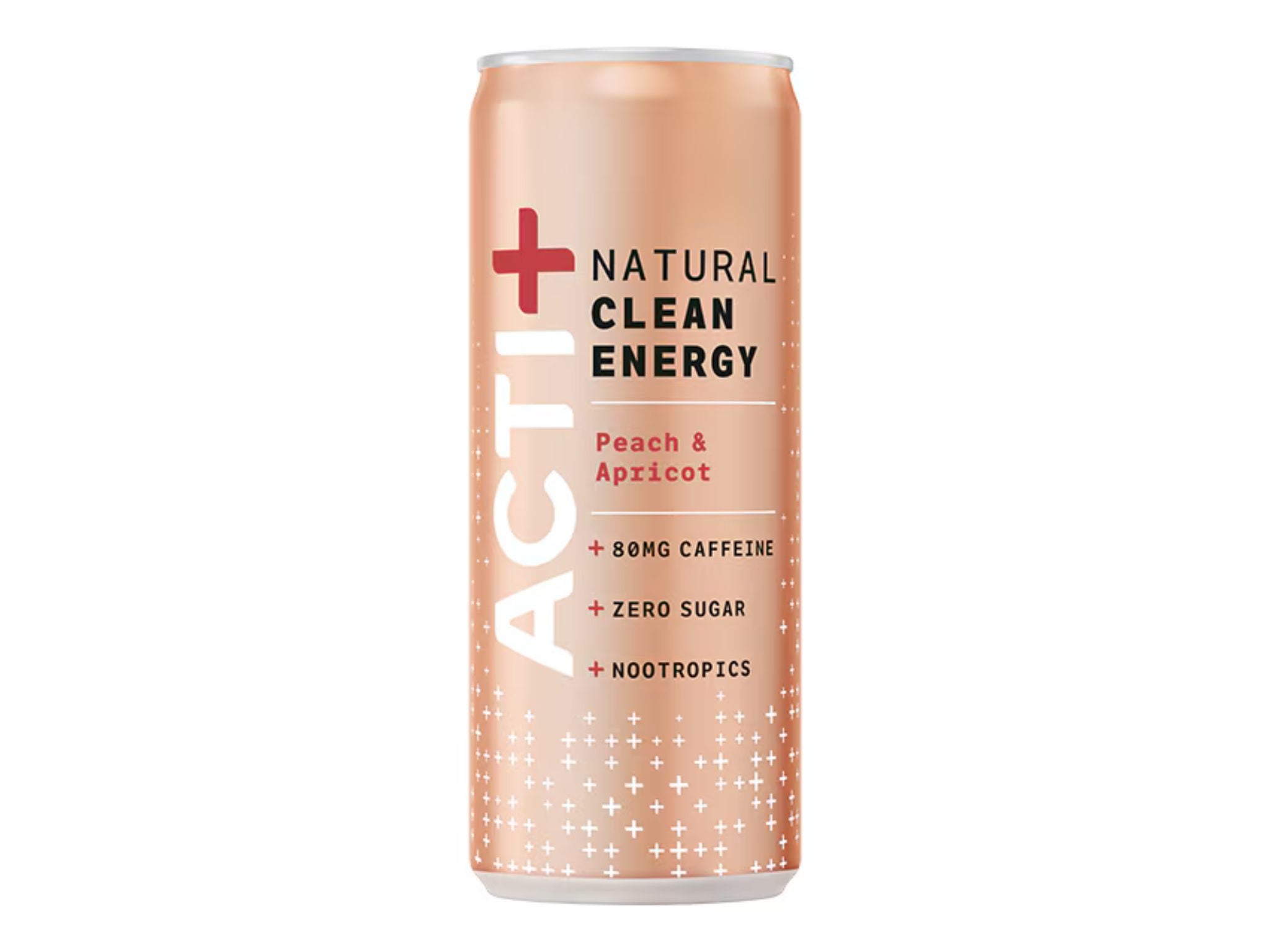
Added nootropics, vitamins D, B6 and B12, and coffee-like caffeine levels earned this Acti+ offering a spot on our list. Nootropics are believed to improve cognitive function, making this a tempting option for those looking to have a productive afternoon at work.
Vitamin D helps regulate the amount of calcium and phosphate in the body – nutrients essential for keeping bones and muscles in good nick, according to the NHS. And vitamins B6 and B12 help the body store energy from food and release energy from food respectively, among other functions.
After drinking Acti+ natural clean energy, I found my energy levels were gently lifted for a few hours, but they didn’t plummet when the effects wore off.
The best way to describe the drink itself is like a seltzer – sparkling with subtle underlying fruit flavours. I found it easy to drink, and a refreshing lunch break tipple.
Buy now £1.99, Hollandandbarrett.com
Perple sports drink
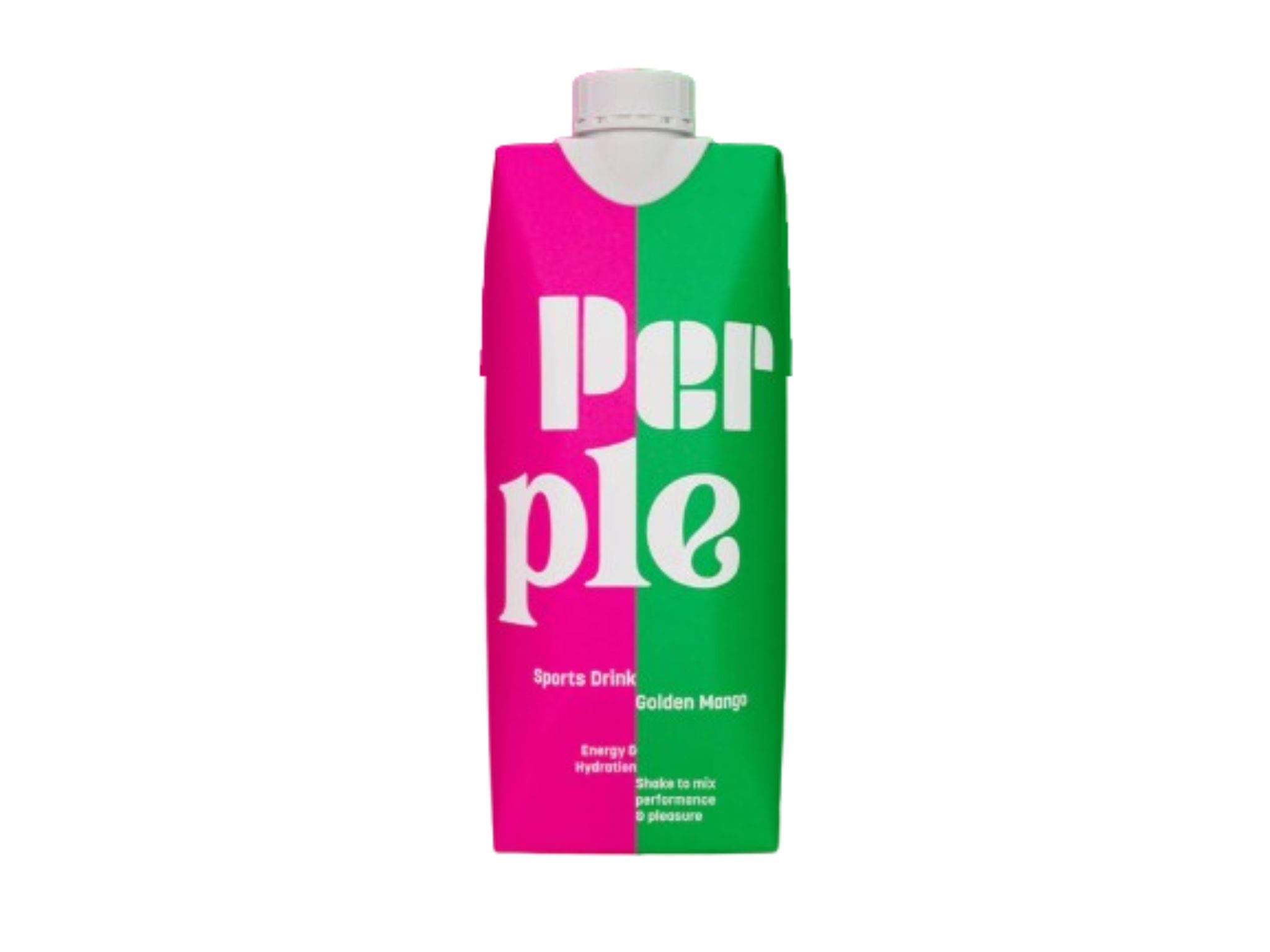
Perple takes the standard energy drink formula and flips it on its head. It’s not fizzy, there’s no caffeine, and it only contains natural ingredients. It also stands out from the crowd by coming in a recyclable cardboard carton, made from 60 per cent plant-based materials. So why is it on this list?
As someone who trains first thing in the morning, I often struggle to squeeze in a meal before a session. Perple allowed me to slurp on its 30g of fast and slow-release carbohydrates on my way to the gym, and didn’t lead to any bloating or discomfort during 90 minutes of varied CrossFit programming. The blood orange option wasn’t to my taste, but I liked how authentic the golden mango flavour was, actually tasting like the fruit rather than a candied imposter.
This lines up with what backer Sebastian Vettel had to say, with the four-time F1 world champ finding the drink “was the first in my 16-year F1 career to have kept me energised right until the end of a grand prix, without any stomach problems”.
With the ingredients coming from natural sources, it’s fairly high in sugar (22.4g), so not one to down at your desk. But before running, gym sessions or sports of up to 90 minutes, it can be handy to have in your gym bag, containing bonus electrolytes via coconut water to help you stay hydrated throughout.
Buy now £14.00, Drinkperple.com
Perple endurance mix
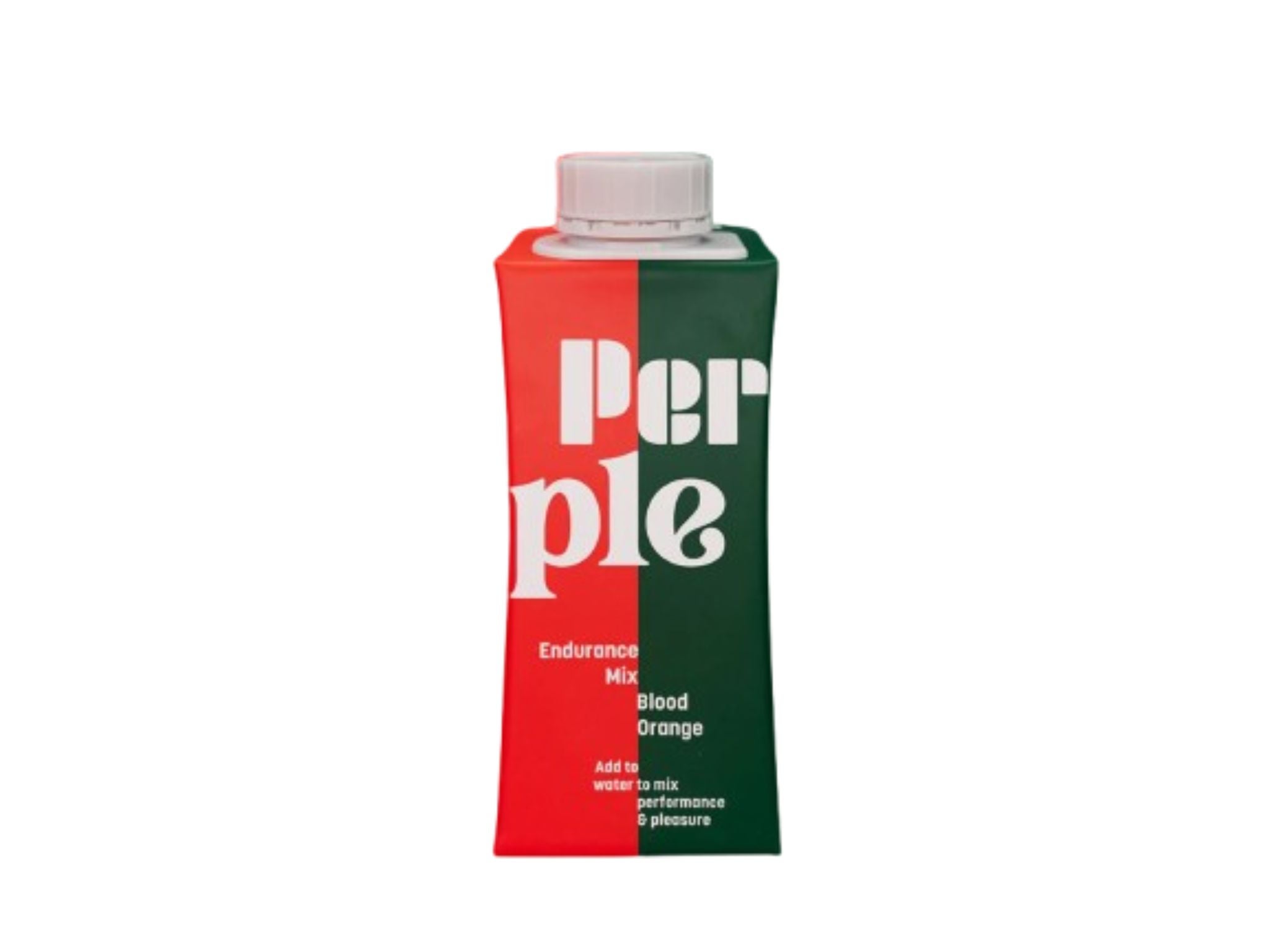
Perple again goes against the energy drink grain with its endurance mix – free from caffeine and fizz. This time it comes in a smaller 200ml carton, recommending recreational exercisers mix either 50ml (if you’re exercising for up to three hours) or 100ml (if you’re exercising for more than three hours) with 200-300ml of water and drink this every hour.
The former provides 20g of carbohydrates and 721mg of electrolytes from concentrated coconut water to keep you fuelled during endurance events. The handy resealable carton is also easy to chuck in a bag or pocket when you’re on these escapades.
Like the Perple sports drink, the flavours were hit and miss with me, and the blood orange wasn’t a favourite. But the summer berries option was far more enjoyable.
So, if you’re an endurance athlete fed up with gels and other supplements filled with maltodextrin and the like, this fuelling and hydrating energy drink is worth keeping on your radar.
Buy now £20.00, Drinkperple.com
C4 smart energy
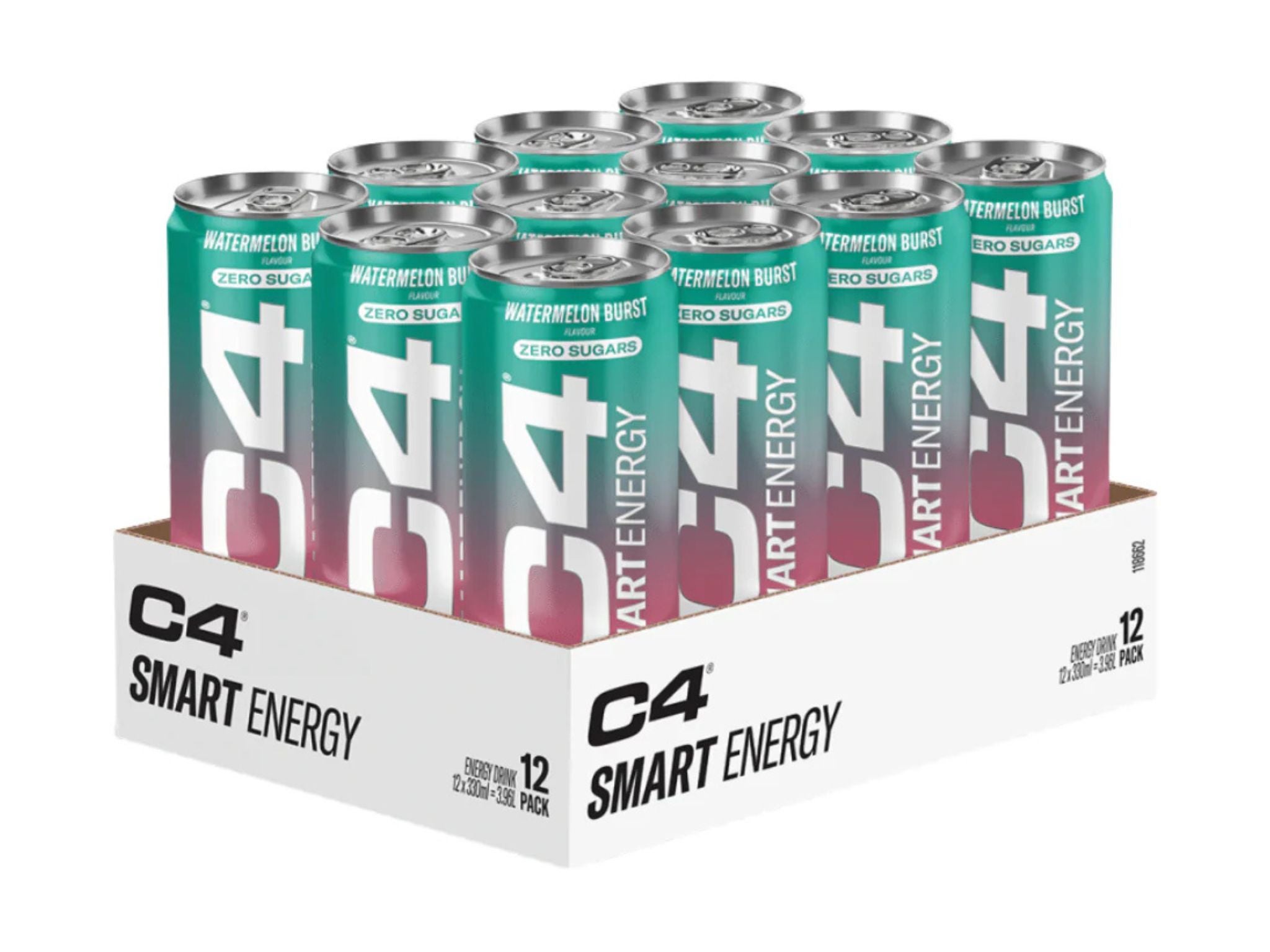
If you like the sweet shop-esque flavour profile of classic energy drinks but you want to swerve the questionable caffeine levels, this inclusion is for you. The watermelon flavour tastes more like something from a pick and mix selection than a plant, and is sure to satisfy those with a sweet tooth.
But it offers roughly half the caffeine content (106mg) of a standard can of C4 performance energy, includes 12g of immune system boosting vitamin C, and contains Cognizin – a supplement, also known as citicoline, which is intended to support brain health.
I tried it during the work day, and it did give me a second wind of energy shortly after lunch, with only a slight lull instead of a dramatic crash when the effects wore off.
Buy now £12.99, Amazon.co.uk
Engergy drink FAQs
What to look for in an energy drink
“Most of the purported benefits of energy drinks can be attributed to caffeine,” Mather says. “We know from research that caffeine blocks adenosine receptors in the brain, which prevents drowsiness, enhances mental alertness and reduces perception of fatigue.”
However, when choosing one, he warns consumers to be wary of their own personal caffeine tolerance. If this is exceeded, it can cause “gastrointestinal distress, jitters and restlessness”, particularly in people who don’t regularly drink caffeinated drinks.
“A dose of between 80-150mg, equivalent to one or two cups of coffee, is ok for most people,” he adds.
Carbohydrates are another common component of energy drinks, providing the fuel you need for exercise. “However, be cautious as some of these drinks contain high amounts of sugar, and if consumed in isolation from exercise, can lead to a crash later on in the day,” Mather explains.
Below, you can find a list of other regular ingredients, and the potential benefits they offer.
Read more: I’ve walked 10,000 steps a day for two years – these five benefits persuaded me to keep it up
Common energy drink ingredients and what they do
Taurine
“Taurine is an amino acid commonly found in energy drinks,” says Mather. “It has been shown to play a role in muscle function and reduce fatigue, while also having a synergistic effect with caffeine. Typical doses in energy drinks are between 500-1,000mg per serving.”
Nootropics
“Most Nootropics found in energy drinks are plant-based compounds known to enhance cognitive function, including aspects like memory, focus and creativity,” Mather says.
“They work through various mechanisms such as enhancing neurotransmitter function and improving blood flow to the brain. There is a growing body of evidence regarding the efficacy of nootropics and the benefits associated with them, so a beverage containing them can definitely be worth considering.”
Adaptogens
“Adaptogens such as shiitake mushrooms offer a wide range of health benefits such as supporting the immune system, reducing stress and enhancing cognitive function,” Mather explains.
“They are known for their ability to help the body adapt to stress by regulating cortisol levels, balancing immune responses and protecting from cell damage. The inclusion of these in an energy drink can boost the drink’s nutritional value and potentially provide benefits alongside a nutritionally balanced diet, given the dose is optimal.”
BCAAs
“Branched-chain amino acids [leucine, isoleucine, and valine] are crucial for muscle recovery and exercise performance,” says Mather. “They can be obtained in the diet through a variety of whole foods.
“However, individuals who follow a vegan or vegetarian diet, along with people who have a low protein intake, may be at risk of not consuming enough BCAAs, which may impact muscle recovery. In this instance, the inclusion of BCAAs in energy drinks can help to increase the drinker’s amino acid intake. BCAAs also serve as an energy source for the muscles, which can be beneficial when taken before exercise.”
B Vitamins
Mather explains that B vitamins, “play a role in energy metabolism, helping the body utilise nutrients effectively. Additionally, vitamin B12 deficiency is linked with cognitive decline, so the inclusion of B vitamins in energy drinks can contribute to the associated benefits.”
Vitamin C
The fruit flavours in some energy drinks are often added to raise the vitamin C profile. “This can help reduce tiredness and fatigue while supporting normal energy metabolism. While not essential, it can be a good addition to an energy drink," explains Mather.
Read more: I stopped drinking for six months – five reasons why it’s one of the best things I’ve ever done







